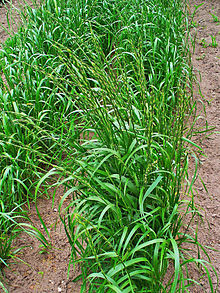 Today's reading comes from Matthew and concerns itself with the Parable of the Weeds and the explanation thereof.
Today's reading comes from Matthew and concerns itself with the Parable of the Weeds and the explanation thereof.Jesus presented another parable to them, saying, “The kingdom of heaven may be compared to a man who sowed good seed in his field. But while his men were sleeping, his enemy came and sowed tares among the wheat, and went away. But when the wheat sprouted and bore grain, then the tares became evident also.
The slaves of the landowner came and said to him, ‘Sir, did you not sow good seed in your field? How then does it have tares?’ And he said to them, ‘An enemy has done this!’ The slaves said to him, ‘Do you want us, then, to go and gather them up?’ But he said, ‘No; for while you are gathering up the tares, you may uproot the wheat with them. Allow both to grow together until the harvest; and in the time of the harvest I will say to the reapers, 'First gather up the tares and bind them in bundles to burn them up; but gather the wheat into my barn.'”
In later passages, Christ explains the parable in spiritual terms, but I wish to first talk about certain things would have been understood by those of the day but may not be readily apparent 2000 years later.
An important and delicate skill of a farmer was the selection of seed, normally done through sifting and picking. It is a painstaking task, but it is vital to the future of the harvest. That the landowner had sown 'good seed' implies that effort was taken ahead of time to ensure that nothing but wheat would be sown. As there are 'tares' in the field, it is not because of the landowner, but from someone else.
The weed referred to above, tares, is known today as poison darnel or false wheat. It parasitises wheat fields and can, as the common name suggests, be poisonous. In addition to any poisonous qualities, the darnel has a very bitter taste, thus even a small amount in the grain would spoil any flour. A unique feature of darnel is that it is very difficult to identify until it and the wheat bear fruit, whereupon the difference is plain, but it is too late to remove the weed from the field without hurting the crop. Because of these features, Roman law explicitly prohibited the sowing of this poisonous weed in even an enemies wheat field. Thus, those who came and sowed the darnel aren't just rivals, but are real 'bad seed' (no, I couldn't refuse).
What do you do, then, with these weeds? To ensure that they do not spread in the coming days, they must be removed. Yet, they have no value in their seed or in their stalk. Yet the frugal master does not discard them, but puts them to what use he can; as fuel for cookfires in an arid land where fuels are in demand.
So....
'Bad seed' can and will enter the field sown with 'good seed', apart from the landowners actions or will and the law.
'Good seed' and 'bad seed' are virtually indistinguishable apart from their fruit.
The fruit of the 'bad seed' will spoil a great amount of the fruit of the 'good seed'.
And His disciples came to Him and said, “Explain to us the parable of the tares of the field.”And He said, “The one who sows the good seed is the Son of Man, and the field is the world; and the good seed, these are the sons of the kingdom; and the tares are the sons of evil, and the enemy who sowed them is the devil, and the harvest is the end of the age; and the reapers are angels."
Well then.
No comments:
Post a Comment